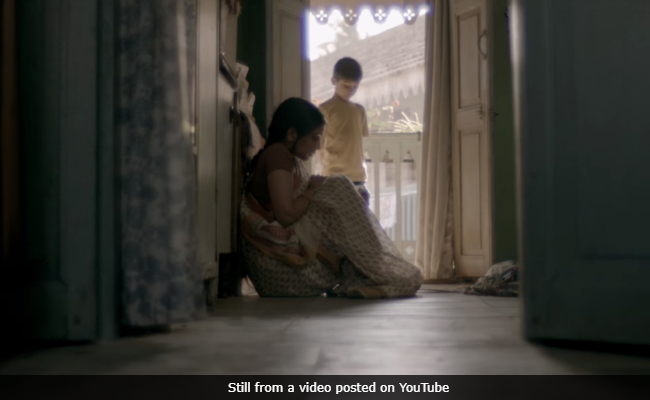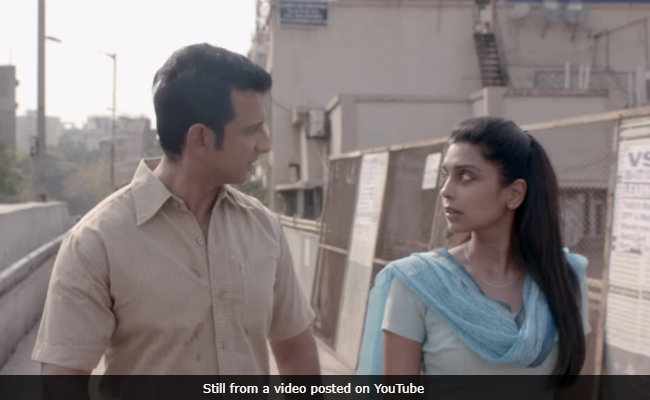
Cast: Renuka Shahane, Richa Chadha, Pulkit Samrat, Sharman Joshi
Director: Arjun Mukherjee
Rating: 2.5 Stars (out of 5)
Promising premise, only partially realized potential: that, in a nutshell, would be the story of 3 Storeys if it were to be judged solely on the strength of its entertainment quotient. But that assessment would be misplaced because this film isn't a conventional crowd-pleaser. A portmanteau drama that probes the turmoil in three sets of ordinary, uneventful lives that conceal dark, disquieting secrets, it is commendably even in tone and rhythm, if not in overall impact.
Helmed by first-time director Arjun Mukherjee and scripted by Althea Delmas-Kaushal, 3 Storeys is built upon a firm foundation. It has some inspired moments, all of which stem from the startling twists in the triptych of interlinked stories of 'faceless' families that live cheek-by-jowl in the same Mumbai chawl but have wildly divergent destinies.
The film kicks off with a female sutradhar revealing that she is interested primarily in people and faces in a crowd. She decides to settle first up on a natty arriviste Vishal Naik (Pulkit Samrat). We see the young man boarding a taxi in the company of a property dealer. He is obviously looking for a house for himself.
The principal figure in this opening segment eventually turns out to be Flory Mendonca (Renuka Shahane, on the big screen after a long hiatus). She is a widow who lives alone in one of the rundown pads in Maya Nagar. Part of her house is up for sale. Aunt Flory quotes an astronomical price of 80 lakh rupees but Vishal signs on the dotted line without batting an eyelid. As the old lady and the new buyer drink coffee and discuss each other's lives, the deal takes the shape of a sinister plot.

3 Storeys Movie Review: A still from the film. (Image courtesy: YouTube))
Two other narrative strands constitute the 100-minute 3 Storeys - the title refers to the levels of the building and is also an all too obvious pun on the number of tales. One is about Varsha (Masumeh Makhija), a woman with an alcoholic, abusive brute for a husband. The other revolves around a college-going Hindu girl Malini (Aisha Ahmed) in love with a Muslim boy Suhail (Ankit Rathi).
Both relationships have significant back stories. The former involves a life-altering heartbreak caused by a misunderstood vow; the latter hinges on a past misdeed by the boy's shopkeeper-father that seals the young couple's fate forever. The turning point of each story, delivered without a drumroll, is meant to catch the audience by surprise. The first one definitely does. The other two are a touch too contrived.

3 Storeys Movie Review: A still from the film. (Image courtesy: YouTube)
In an interesting, if not entirely convincing, final act, 3 Storeys goes beyond the confines of its text and, through the voice and the person of the narrator, explores the dynamics of storytelling, the role of the human imagination in the way tales are told, the unpredictability of the characters that are conjured up, and the whims of the raconteur. It even suggests that the lives of the three protagonists could have been very different if only the storyteller had willed it. This distancing effect needed to be far more pronounced for it to achieve the desired result. The drawback somewhat blunts the film's edge.
The screenwriter and the director, however, impart touches to the film that often lift it above the ordinary. The use of the residential locality, home to people bound by their struggles to make ends meet, as a microcosm for the diversity of Mumbai is noteworthy.
The sensitive, non-judgmental portrayal of the women - apart from the main three, there are others, including Suhana (Saunskruti Kher), who is happily married to embroidery master Shankar Verma (Sharman Joshi), the man that Varsha was once madly in love with cutting across the caste divide - adds an edge to the multi-layered construct.

3 Storeys Movie Review: A still from the film. (Image courtesy: YouTube)
Livening up the scene is a voluptuous, mysterious Leela (Richa Chadha), who lives on the edge of the colony. A listless, bald cop Ganpat Rao (Himanshu Malik) is besotted with her. But this lady has far too much up her sleeves for the clueless silent admirer to be able to actually make any headway in attracting her attention.

3 Storeys Movie Review: A still from the film. (Image courtesy: YouTube)
The casting is great and the performances wonderful. Especially laudable is Renuka Shahane, who effortlessly slips into the skin of a temperamental Goan Catholic matron although one can see that she devoted hours of labour to get the make-up right. Masumeh Makhija, whose eyes do as much of the talking as her lips, is equally good. The two newcomers in the cast, Ankit Rathi and Aisha Ahmed, give a good account of themselves.
The two principal male actors - Pulkit Samrat and Sharman Joshi - pale a tad in comparison. The fault isn't entirely theirs. They are 'outsiders' to the world that 3 Storeysis located in. Their on-screen personas are at odds with the feisty women that they encounter and, therefore, do not yield the percentage that the efforts of the female actors, including Richa Chadha (who has far less of a play than the others), do.
Towards the end of the film, the narrator asserts that duniya ki tarah kahani chalti rehti hai (like the world at large, stories never stop) and that there is no such thing as "a perfect end". Point well taken, but considering all the beginnings and endings, comings and goings, and hopes and setbacks that constitute 3 Storeys, the film could have done with a stronger culmination. It meanders to a close, leaving the audience more flummoxed than intrigued.
For all its flaws, 3 Storeys is still worth watching because it seeks to engage with the audience in a manner that is anything but run of the mill.
